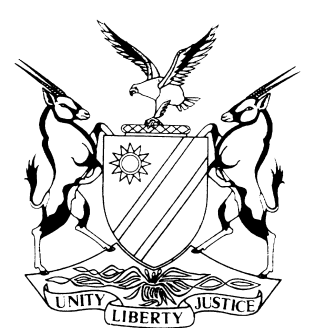
CASE NO.: CR 22/2012
IN THE HIGH COURT OF NAMBIA
In the matter between:
THE STATE
versus
ZOMBO MUSOKI CHRISTO ACCUSED 1
GARCIA MANKENENE ACCUSED 2
(HIGH COURT REVIEW CASE NO.: 406/2012)
CORAM: MILLER, AJ et HOFF, J
DELIVERED ON: 19 March 2012
REVIEW JUDGMENT
MILLER, A J [1] In this matter the two accused were arrested at the Noordoewer border post on 18 March 2011 and charged with contravening Section 29 (5) of the Immigration Control Act, Act 7 of 1993.
[2] The gravamen of the charge was that each of them, being foreigners, had remained in Namibia, after the time period to be in Namibia stipulated in an entry permit had expired.
[3] The facts relating to each of the accused are not related and it is apparent that each had committed a separate offence.
[4] Despite this they were charged jointly on the same charge sheet. Each pleaded guilty and were convicted following the answers they gave pursuant to questions put to them in terms of Section 112 (1) (b) of Act 51 of 1977.
[5] Accused 1 was sentenced to a fine of N$1 500-00 or 7 months imprisonment. Accused 2 was sentenced to a fine of N$1 000-00 or 5 months imprisonment.
[6] When the case was submitted to me for purposes of review I addressed the following remarks to the magistrate:
“The Reviewing Judge remarks as follows:
The learned magistrate is requested to provide reasons why the two accused, who committed different offences, albeit on the same day were charged jointly.
Your urgent reply will be appreciated.”
[7] To this the magistrate responded as follows:
“After perusing the remarks of the Honourable Reviewing Judge my response is as follows:
In the present matter both accused persons were arrested on the same day and at the same place on the 18th March 2011 and at Noordoewer border post.
The court relied on Section 156 of the Criminal Procedure Act, Act 51 of 1977 which reads as follows:
“Any number of persons charged in respect of separate offences committed at the same place and at the same time, may be charged and tried together in respect of such offences if the prosecutor informs the court that evidence admissible at the trial of one of such persons will in his (her) opinion, also be admissible as evidence at the trial of any other such person or persons.”
In the present case the accused persons were arrested by the same Immigration officer upon their exit. If evidence were to be led it ought to have been similar evidence from the same officer.
I perused the cases of S v Chawe en Ander 1970 (2) 414 (only the head note which is in English) and that of S v Marimo and others 1973 (2) 442. I found those cases to be distinguishable from the present in the sense that in the Chawe case one accused was used to implicate the other yet in the Marimo case a “mass trial” was held on accuseds facing completely unrelated charges. In the present case the accused persons are charged with violation Section 29 (5) of Act 7 of 1993, after they had both entered Namibia on the 12th January 2011, but granted entry permits of differing lengths. They then over-stayed by a different number of days yet they were arrested on the same day at the same place.
At their trial separate charge sheets were put to them and they pleaded to them separately. Upon their pleas of guilty they were questioned in terms of Section 112 (1) (b) resulting in their convictions. In the event that the court a quo committed a misjoinder, there is no apparent substantial miscarriage of justice ex-facie the case record. Nonetheless if this court misdirected itself on the application or interpretation of the law I humbly seek learned guidance from his Lordship.
As it pleases his Lordship, the Honourable Reviewing Judge.
M. Dube
District Magistrate
KARASBURG
[8] In my view the magistrate’s reliance on Section 156 of Act 51 of 1977 is misplaced.
[9] Firstly the prosecutor did not inform the court that in his opinion evidence admissible against one accused was also, in his opinion admissible against the other. Quite clearly the prosecutor could not have formed such an opinion.
[10] Evidence that accused no. 1, for instance, had overstayed the period within which he was allowed to be in Namibia, was not admissible against accused no. 2, such evidence being entirely irrelevant. Nor can it be said, in my view that the offences were committed at the same time and at the same place. The only common denominator is the fact that they were arrested at the border post by the same person.
[11] I accordingly find that the accused were improperly joined, which constitutes on irregularity.
[12] The fact of the irregularity did not, however cause either of the accused to suffer any prejudice in the instant case.
[13] I will therefore confirm the convictions and the sentences imposed.
_________
MILLER AJ
I agree
___________
HOFF, J